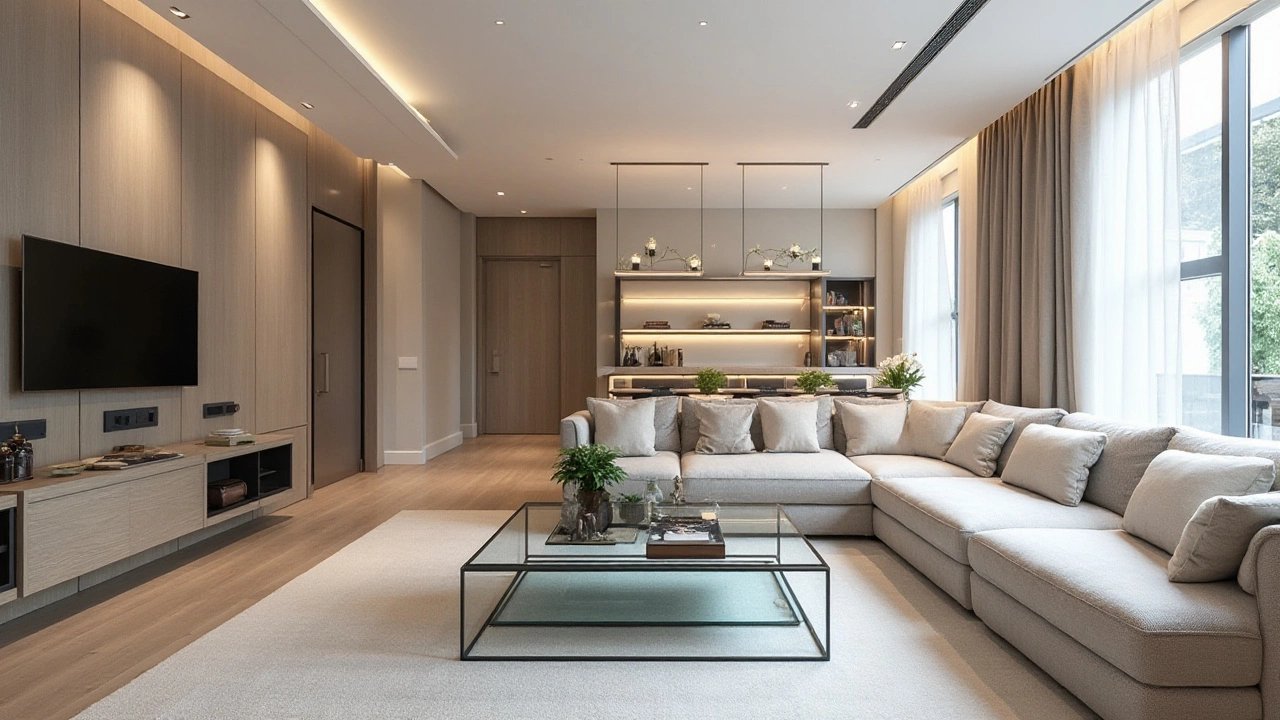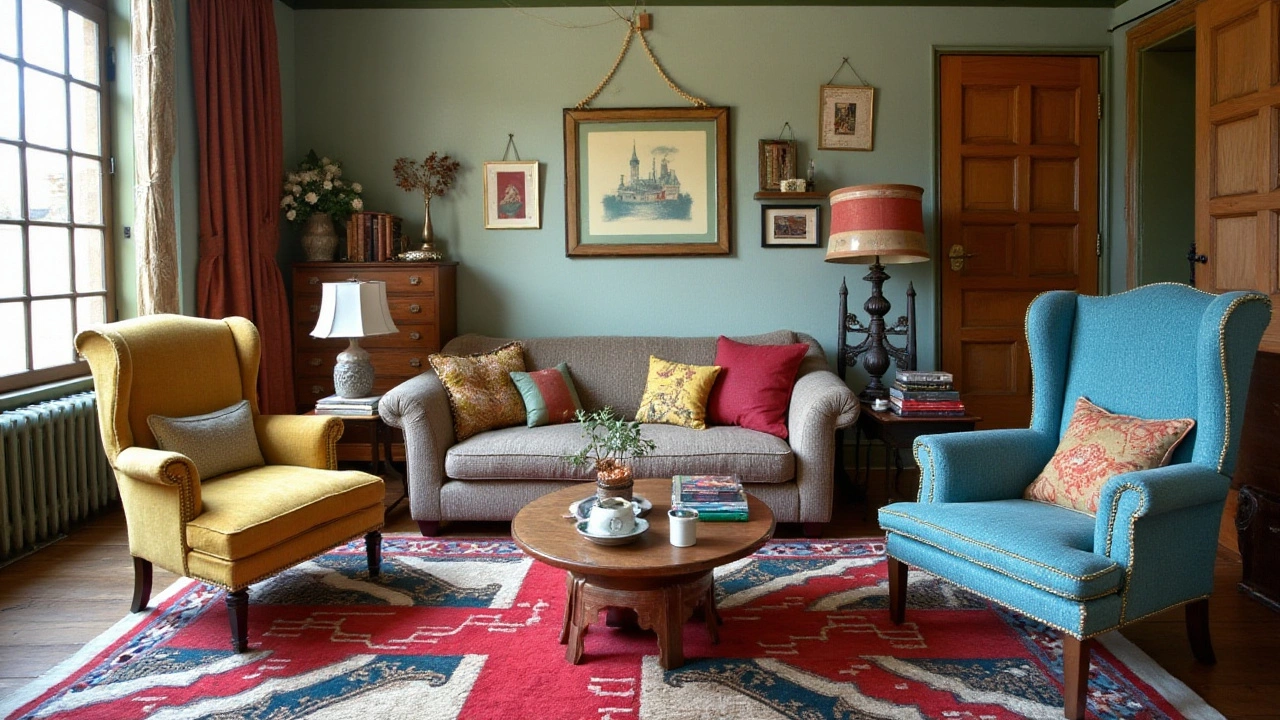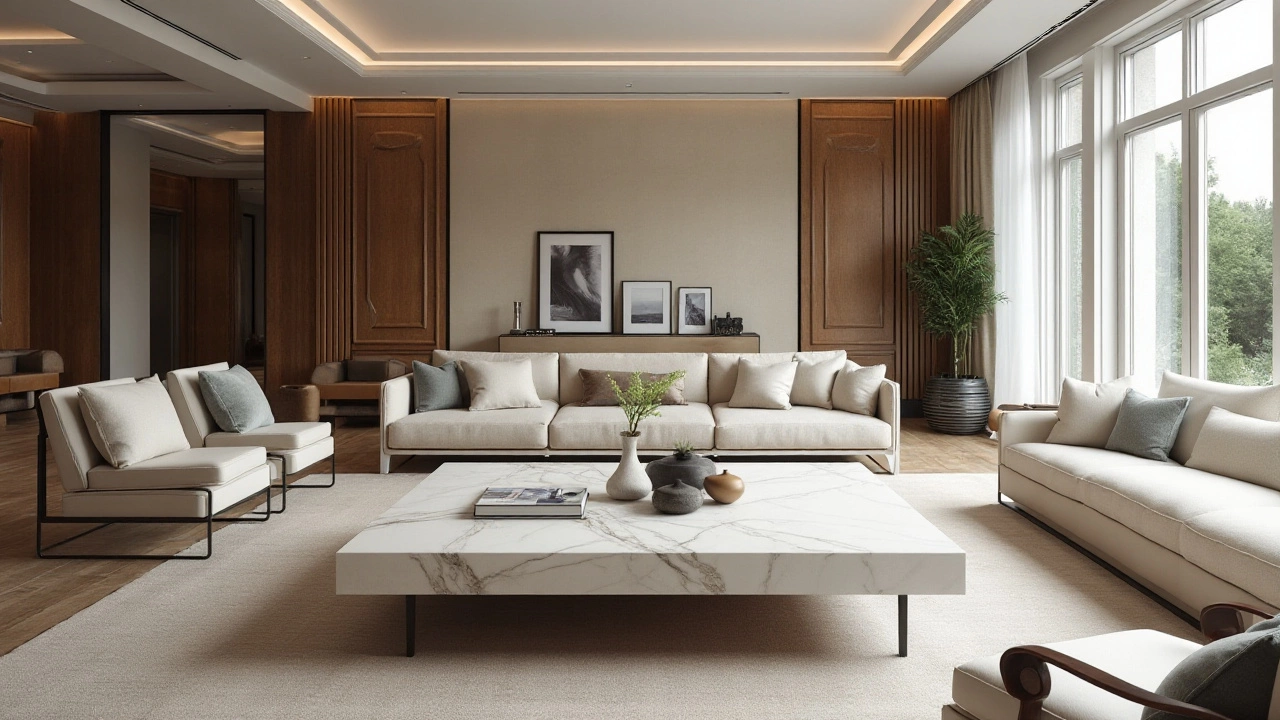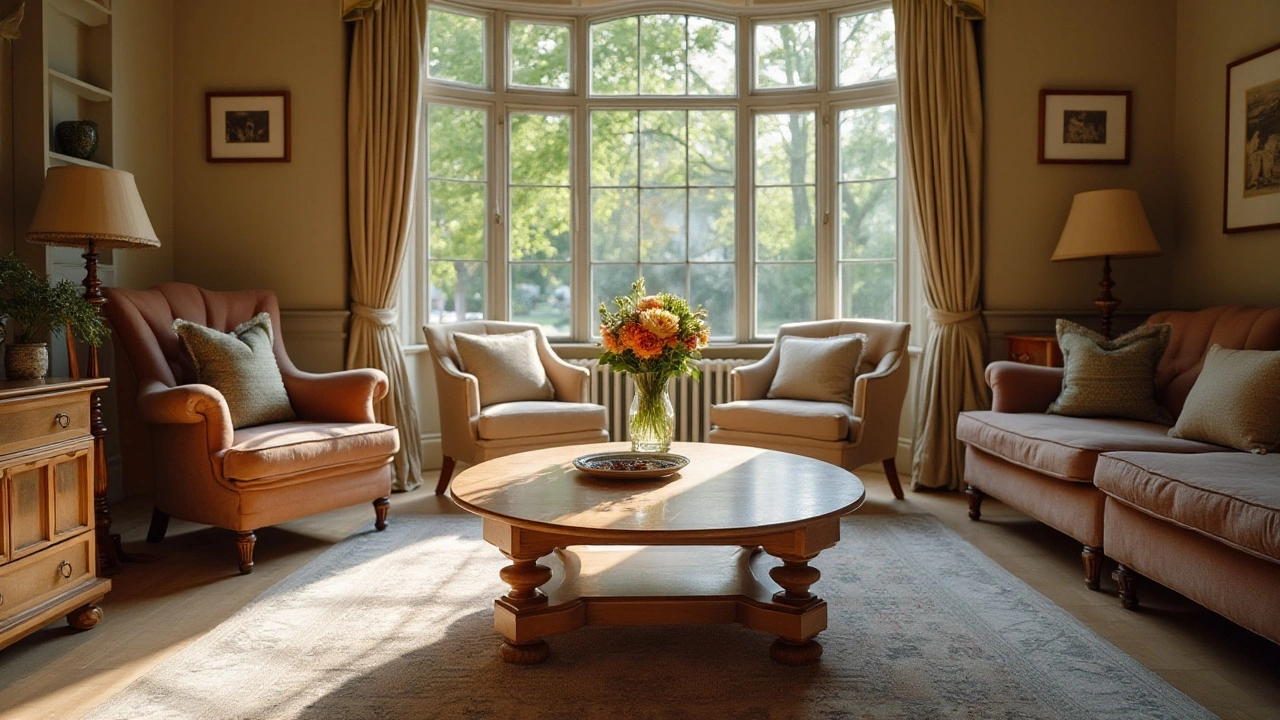When it comes to picking the right coffee table, the debate often narrows down to two classic shapes: round and rectangle. Each brings something special to your living room, adapting to different styles and functional needs.
A coffee table isn't just a piece of furniture; it's the centerpiece of your social space. It must fit well in your room, complement your seating arrangement, and suit your daily lifestyle. Knowing whether a round or rectangle shape is better for you involves understanding these elements closely.
We'll guide you through the essentials to consider, ensuring you pick a table that not only enhances your room’s look but also its practicality. Let's dive into the details that will help you make the best choice tailored just for your space.
Room Size and Shape
The shape and size of your room play a major role when deciding whether a round coffee table or a rectangle coffee table is the right fit. Every room is as unique as the home it belongs to, and the way furniture interacts within the space can affect the comfort and flow of movement. Large and sprawling living rooms can often accommodate the linear presence of rectangle tables. This classic shape tends to anchor the room, providing a clean, defined space that complements elongated seating arrangements or sectionals. It's a great way to bring balance to a wide-open area, particularly if your seating lines the perimeter.
On the other hand, smaller or oddly shaped rooms might benefit from the versatility of a round coffee table. Rounded edges can create a sense of space and openness, inviting movement and preventing feelings of confinement. This shape is especially valuable in a narrow room where traffic might be cramped. Even in larger rooms, a round table can work beautifully, curving away from corners and softening strict architectural lines. This can make a big difference in terms of fluidity, especially if you enjoy entertaining and need flexibility for maneuvering around people or items.
Understanding proportions is vital. As a rule of thumb, your coffee table should be about two-thirds the length of your sofa. This ensures that it doesn’t overwhelm your furniture but still provides adequate surface area for all your needs, be it a remote, a book, or even a place to rest your feet after a long day. Recently, the interior design magazine Elle Decor noted,
"A coffee table should enhance your living room, offering a visual midpoint without drawing away from the heart of your home."This balance can transform a room from merely functional to alluring and cozy.
In assessing your room's physical attributes, consider the pathways and how frequently people pass through. Do you often accommodate guests, potentially requiring more room for movement? Or is this space more privately cherished, allowing you to prioritize surface space over navigable room? These choices will highly influence which coffee table style makes the most sense for you. Keep in mind unique room features, such as a fireplace or a scenic window view, which could also dictate the preferred shape. Countless designs exist to suit diverse needs, so it's certainly worth considering these nuances when choosing your centerpiece.

Seating Arrangements
The way you arrange seating around your coffee table can dramatically influence the room's dynamic and conversation flow. When selecting between a round coffee table and a rectangle coffee table, consider how the shape will work with your existing furniture layout. Rectangle tables are often a favorable choice for larger seating arrangements because they fit snugly between parallel sofas or a combination of a couch and chairs, maximizing space efficiently. This creates a more structured look and ensures everyone has easy access to the table, making it ideal for bigger living spaces or if you frequently host guests.
On the other hand, the cozy charm of a round coffee table comes into play in more intimate settings. The absence of sharp corners allows for easier movement and often makes rooms feel more open and inviting. If you have a sectional or a more open seating plan, a round table can be a brilliant addition, encouraging a more relaxed, inclusive environment. It's said by interior decorator William Yeoward, "Round tables promote conversation," because everyone faces the center, inviting more intimate dialogue.
Let's break it down further. In settings where multiple seating areas exist, such as a larger living room that serves as a dual-purpose area, mixing table shapes can add a dynamic visual interest. You might place a rectangle table centrally with a round side table tucked near a reading nook. Placement isn't just about aesthetics; it impacts usability too. You want your coffee table to be reachable from every spot on the couch, ideally sitting at about the same height as your seat cushions for optimal functionality.
When understanding the impact of table shape on seating arrangement, don't forget about the space flow, which considers how people move through the room. Chairs and sofas shouldn't push right up to the table; leave enough clearance for knees and for people to move in and out comfortably. Typical space between the coffee table and the furniture should be around 18 inches, though this might vary depending on room size and furniture style. A well-organized seating plan centered around the right coffee table can transform a room, shifting it from just another space to the heart of your home.

Functionality and Style
When selecting a coffee table for your living space, a balanced consideration of functionality and style is crucial. These tables serve not only as aesthetic anchors in a room but also as practical hubs for daily activity. The rectangle coffee table often attracts those who require more surface area, ideal for showcasing books, decorative items, or even the occasional board game setup. They tend to fit seamlessly in more linear, structured environments where their edges align well with long sofas or sectionals.
In contrast, the round coffee table introduces a different dynamic. It’s particularly efficient in promoting movement around the table, making it suitable for smaller or eclectic spaces. Its absence of sharp corners reduces the risk of bumps and bruises, a feature especially appreciated by families with young children or pets. Style, of course, plays an immeasurable role in this decision. The sleek simplicity of a round table may lend itself beautifully to modernist interiors, bringing a soft element to spaces that may otherwise feel too rigid.
Consider how these tables contribute to the style narrative you wish to tell in your space. For instance, a beautifully crafted round table can break the monotony of angular, sharp-cornered furniture and add a sense of ease and flow to a room. A rectangle table with clean lines might echo the contemporary feel of a loft-style living area, providing a robust anchor for an otherwise open space.
"A coffee table is as personal as your living space," notes renowned interior designer John Smith, "choosing the right one is about matching it with both your aesthetic goals and everyday needs."
In a study on home decor trends, it was found that 60% of designers favored tables that could be easily styled with interchangeable decor pieces, highlighting their versatility in design schemes. This flexibility is a valuable feature since it allows homeowners to change decorations seasonally or to reflect their mood. Ultimately, the functionality of a coffee table—whether for holding drinks during a soiree or organizing magazines and remotes daily—is as important as the story it tells visually in a room.
To streamline your decision-making process, consider the following: Do you prefer a table that makes a bold, singular statement or one that offers discreet practicality? Another classic debate is that of material choice, which also affects both look and usability. Glass-topped tables, often associated with elegance and modernity, might pair best with refined, minimalist spaces. On the other hand, wooden options can offer warmth and texture, aligning beautifully with traditional or rustic themes.

Lifestyle Considerations
Your lifestyle plays a significant role in determining the right coffee table for you. If your day-to-day activities revolve around hosting gatherings or having regular family evenings, the choice between a round coffee table and a rectangle coffee table becomes critical. Round tables are often praised for their social nature. The lack of edges means there's no clear-cut head of the table, promoting a sense of equality and conversation. This setting can encourage a more relaxed and intimate atmosphere, making it ideal for families or social butterflies who frequently have guests over.
However, perhaps you have young children in your home, in which case a round table might also be a safer option due to the absence of sharp corners. It can help avoid those tiny bruises that curious toddlers often acquire when exploring their world. On the flip side, those who lean towards minimalism in a space might opt for a rectangle coffee table, which inherently offers more surface area, making it ideal for holding decorative items, books, or even work-related tools. A nifty selection that fits your lifestyle doesn’t just fulfill your aesthetic desires but also accommodates your practical needs efficiently.
There's an interesting insight from the design expert Nate Berkus, who once said,
"Your home should tell the story of who you are, and be a collection of what you love."This becomes particularly relevant when you think about maintaining a room that reflects not just your taste but your everyday living. Those who are occupied with work from home arrangements may find having a rectangle table preferable due to its orderly structure, which can easily divide areas for work and leisure within the same space.
If you are someone who changes settings often, enjoying the flexibility of shifting furniture around as the season or your mood changes, the ease of moving a round coffee table can be advantageous owing to its symmetrical form. It’s worth noting that some coffee tables also offer storage options which can be a game-changer. Imagine finishing a cozy evening in the living room and being able to effortlessly store blankets or magazines right under the table.
To give you a sense of the alignment of coffee tables with various activities, consider the following table assessing their suitability based on lifestyle:
| Activity | Round Table Suitability | Rectangle Table Suitability |
|---|---|---|
| Family Games Night | High | Moderate |
| Working from Home | Moderate | High |
| Entertaining Guests | High | High |
| Relaxation and Reading | Moderate | High |
In brief, understanding your lifestyle's needs will help guide you toward the optimal coffee table selection that harmoniously caters to both function and form in your living space.


Write a comment